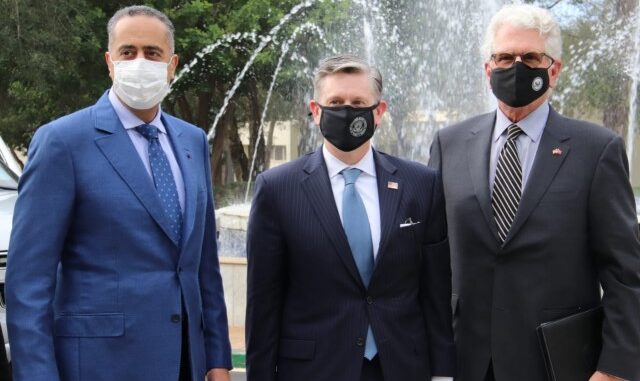
Just one week after the United States officially recognized Morocco’s sovereignty over the Sahara, a senior White House official visited Morocco Thursday for talks with Moroccan officials on security issues.
The Deputy Assistant to the US President and National Security Council Senior Director in Charge of Africa and the Middle East, Robert Greenway, actually held a meeting in Rabat with Abdellatif Hammouchi, the head of Morocco’s police (General Directorate of National Security/ DGSN) and domestic intelligence (General Directorate of Territorial Surveillance /DGST).
The two sides reviewed prospects of bilateral cooperation in various security fields, and the “promising” prospects for strengthening security cooperation between the two countries, describing this cooperation as “a model to be emulated at the regional and international levels.”
They welcomed the excellent relations binding the two countries and convened that strong security cooperation is one of the foundations of the Morocco-US partnership.
The US official and Hammouchi discussed regional and international security issues, with focus on hotbeds of tension in Syria, Iraq and the Sahel particularly, where the terrorist threats are growing along all forms of transnational organized crime.
The US official, who was accompanied by ambassador to Rabat David Fischer, hailed the key role played by Morocco in combating terrorism and organized crime at the national and international levels, and the importance of the information and experiences it shares with its various international partners, who recognize the Kingdom’s regional leadership in countering terrorism, irregular migration, and extremism.
He also expressed the United States’ commitment to upgrade this cooperation and diversify its forms and fields, to allow the creation of a common security front capable of denying terrorists every safe haven, rear bases, or sources of financing.
The two sides also reviewed the means and mechanisms for strengthening bilateral security cooperation in the Moroccan Sahara, especially in the wake of the American decision to recognize Morocco’s full sovereignty over all of its southern territories, a decision that signaled a new era in Morocco-US relations.
In the proclamation recognizing Morocco’s sovereignty over the Sahara, President Donald Trump also announced the opening of a consulate in the city of Dakhla, a decision that will surely encourage investment and economic development in the region.
US Secretary of State Mike Pompeo had met with Hammouchi in December 2019 and had then hailed the Morocco-US security partnership.
“We value our partnership with Morocco in the fight against terrorism and we are working together to advance peace and security,” Pompeo wrote on Twitter after the meeting.
In an interview with MAP earlier this week, the US ambassador commended as “robust” and “long-standing” Cooperation between Rabat and Washington in the fight against terrorism.
David Fischer stressed that the two countries are working closely to preserve their national security interests and that Morocco remains an “important” partner on a series of security issues. Morocco’s “successful” efforts in this area have helped to mitigate the risks associated with the scourge of terrorism, he said.
Recalling the roadmap for the 10-year-long defense cooperation signed last October between the two countries, the US diplomat said this agreement aims to “guide” bilateral cooperation in priority areas, and “to face, together and in a more effective manner, regional threats.”
Morocco is a key stabilizing force in the Maghreb and the Sahel, and the strength of its security apparatus has direct consequences for Africa, Europe, and the Mediterranean basin.
